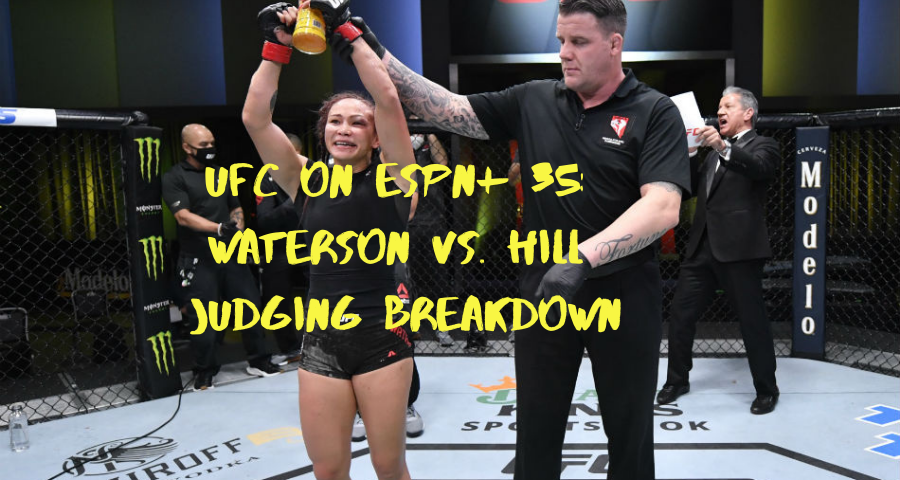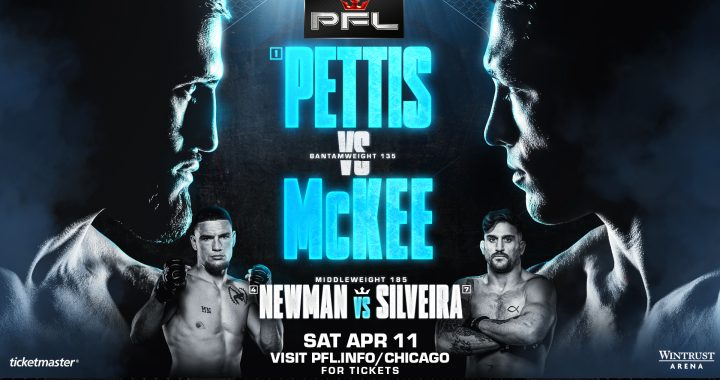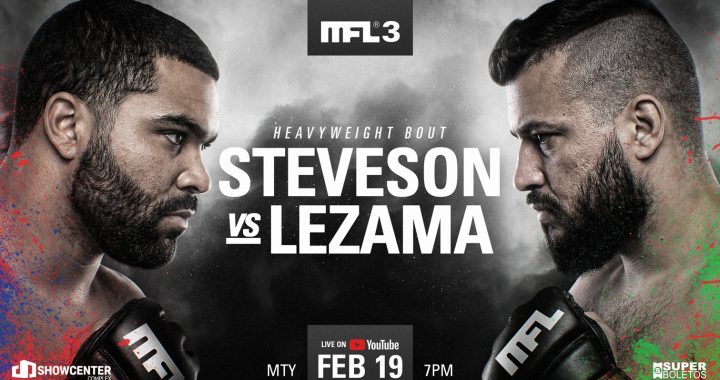
UFC on ESPN+ 35: Waterson vs. Hill judging breakdown
For our temperamental little MMA community, nothing puts a damper on a fantastic fight like a close decision.
That’s a shame, because Michelle Waterson and Angela Hill went to war for 25 minutes on Saturday night in Las Vegas during the headliner of UFC on ESPN+ 35. Theirs was the type of bout that flies in the face of Neanderthals who think the women’s divisions aren’t worthy as non-title main attractions. Any MMA fan worth his or her salt could see from a mile away this would be a terrific fight, and even better with it taking place over five rounds instead of the original three. That change only happened after the planned headliner between Thiago Santos and Glover Teixeira was nixed by the latter’s positive COVID-19 diagnosis.
But here we are, a day removed from one of the best fights ever held at UFC Apex, grumbling about one judges’ scorecard or another. We’re not heaping due praise on Hill for her torrid first round, when her punching power was at its peak, unfazed by Waterson’s kicks as she marked up her opponent’s face. Nobody’s giving Waterson much credit for securing a pair of close but clear rounds in her favor — the third and fourth — with a well-timed takedown and some more urgency in her strikes both on the feet and the mat.
Instead, everyone’s mad about judge Sal D’Amato scoring the second for Waterson — Chris Lee and Derek Cleary saw it for Hill. The taste of sour grapes lingers in the air over both D’Amato and Cleary scoring the final, deciding round for Waterson, making Lee the de facto hero of the pro-Hill masses. All told, that meant D’Amato and Cleary scored Waterson the winner, 49-46 and 48-47 respectively, while Lee had Hill at 48-47.
OK, then. If we can’t look past the scores of those two rounds, then let’s look at why they were scored that way, using the official scoring criteria as a guide. I recommend you go back and watch these rounds too, but if you do, do so on the Spanish-language version (if you only speak English, as I do). That way you can hear all the in-cage sounds without being influenced by the commentary. It’s the best of both worlds for an exercise like this.
Round 2
For the first half of the round, it’s pretty even. You could make a case that Waterson is actually scoring better with snappier kicks, while avoiding the brunt of the punishment Hill’s punches intended to inflict. A narrow edge, to be sure, but it’s noticeable.
Then Hill lands a stiff right hook that drifts Waterson laterally, right at the midway point of the round. It’s the best punch of the round, arguably the best of the fight as a whole with the benefit of hindsight. Hill repeats with another right hook that goes unanswered, and these are scoring well. The next minute or so goes more in her favor than Waterson’s, but The Karate Hottie does find a home for some punch-kick combos and good punches over the final minute.
It’s a close round. For all my scorecard is worth (nothing), I had it for Hill based on the more immediate impact of her strikes landed compared to Waterson’s, but it wasn’t by all that much. You’d have to imagine that’s what Cleary and Lee thought too. But I can’t say I’m surprised by D’Amato scoring it for Waterson. Even before the scores were announced, I tweeted my assumption this round would be split. Fortunately, it split the way most of us saw it. As much as D’Amato giving this one to Waterson got folks ticked off, it ultimately had zero effect on the outcome of the fight.
And, not that judges can access this information, the strikes landed numbers were almost dead even. According to UFC Stats, Hill edged total strikes 35-33 and significant strikes 33-31. Judges would tell you those numbers don’t really tell the whole story when you’re accounting for the quality of strikes, though. I still had Hill landing the more effective strikes, but things do look different right up against the cage than they do from our couches at home.
Round 5
With Cleary and Lee seeing it 38-38 entering the final frame, it didn’t matter if D’Amato had somehow given every round to Waterson. Round 5 would decide the winner, regardless.
From a cold-hard numbers standpoint, this was another razor-close round. Hill again was ahead by a slim two-strike margin, 39-37 on total strikes (all “significant,” whatever that means). Any time the total number of strikes on either side is that close, and there aren’t any big knockdowns or any obvious moments when a fighter gets rocked, you’ve gotta brace for a judges’ split.
But numbers often lie in MMA. We’re nowhere near replacing the judges with AI robots. We need people to decide the degrees of impact from a strike, and none of them look at strikes in binary “significant or … insignificant(?) strikes.”
The first few minutes are nearly a dead heat. Waterson’s nose leaks a trickle of blood, but that damage was dealt in before the final round began. It’s not clear that Hill made it considerably worse over the last 5 minutes. After the midway point, Waterson begins to find a more consistent home for her strikes, including kicks to all regions and taking a slim lead over Overkill in my estimation. On the whole, Hill doesn’t quite have the same pop in her punches as she had 20 minutes before. Neither does Waterson, but her second wind is carrying her just enough.
With about 40 seconds left, Hill connects with a short, stiff right, and Waterson’s body language lets us know she ate a good one. A stiff Hill jab with 25 tics left feels weighty. But Waterson again maintains distance with some solid kicks to the face and body. The final 10 seconds, that critical time we all at home remember best, sees Overkill land a handful of good clinch knees and a blunt elbow just before the horn ends the action.
Who definitively won a round like that? Nobody, that’s who. You can make a case for Waterson, as D’Amato and Cleary did — that’s how I saw it live. Hill has merit to win that one too, but not simply because she won the final 10 seconds of an otherwise competitive 5-minute round. Neither woman put enough of a stamp on this round to be denied an obvious victory.
To a point, I get the furor over Hill not getting the nod. She is very likable. She comes to bang every time she enters the cage. She’s funny, intelligent and engages with her fans outside the cage. She’s a trailblazer, as the first African American woman to both compete in the octagon and headline a UFC event. I had the pleasure of interviewing her years ago when she was on “The Ultimate Fighter,” and I’ve enjoyed following her martial arts journey from afar ever since. Like me, she’s a hardcore gamer, and I’d have to assume that resonates with a ton of us MMA die-hards. If I’m being honest, my rooting interest Saturday night was with her.
But I can imagine an alternate universe in which judges D’Amato or Cleary had the fifth round for Hill, and a sizable chunk of the MMA community wonders what the heck Lee and the other guy were thinking by handing the fight to Hill over Waterson. In a fight this close, and in a world in which judges will virtually never award 10-10 rounds anymore, someone is going to be the hard-luck loser. It’s a shame that the UFC pay structure leaves someone out in the cold without a win bonus, that’s the unfortunate reality of this universe.
Here’s a breakdown of the number of rounds, fight assignments, and individual round dissents from the majority per judge, noting that dissents aren’t necessarily right or wrong:
- Mike Bell: 9 rounds, 5 assignments, 0 dissents
- Cleary: 13 rounds, 5 assignments, 1 dissents
- D’Amato: 14 rounds, 5 assignments, 3 dissents
- Dave Hagen: 6 rounds, 3 assignments, 1 dissent
- Junichiro Kamijo: 5 rounds, 4 assignments, 1 dissent
- Lee: 12 rounds, 4 assignments, 1 dissents
- Ron McCarthy: 6 rounds, 4 assignments, 0 dissents
- Tony Weeks: 4 rounds, 3 assignments, 0 dissents
- Rick Winter: 6 rounds, 3 assignments, 0 dissents
Yep, that’s three dissents for D’Amato. I already covered the one, which doesn’t offend me the way it does so many other viewers at home.
My gripe is with the other two, which came in Sijara Eubanks’ unanimous 29-27 win over Julia Avila. McCarthy and Bell both assessed 10-8 in the second and 10-9 in the third, while D’Amato had the opposite. I completely agree with the majority here.
UFC even shared my tweet for round 2 on the live broadcast: “R2 10-8 Eubanks. Great arm-triangle attacks and grappling dominance. She’s up 19-18 now.” I stand by that today, having rewatched the fight. SarJ checked all three Ds judges look for when assessing 10-8s: impact (damage), dominance and duration. Grappling dominance was big for Eubanks, who spent almost 4 minutes in dominant positions while seeking the chokes I tweeted about — three submission attempts in all — which both had Avila in degrees of trouble. The time in grappling control and attacking the subs give you duration, and some effective ground strikes are the damage. This is what 10-8 looks like in 2020. Bell and McCarthy apparently agreed. D’Amato did not.
Round 3 was much closer, by comparison. SarJ was in charge again on the mat for most of the frame, but she didn’t have any submission attacks this time. She checked off grappling dominance, and she was landing some great ground strikes near the end, especially. But for much of the round, the damage was intermittent. Avila even was fishing for some subs over the final two minutes, although none were particularly threatening or locked in. I could understand this as a very borderline 10-8, because only two Ds need to be checked in order to consider that score. Still, this was a 10-9 in my eyes, and in the eyes of McCarthy and Bell.
Why D’Amato saw the less lopsided round as a 10-8 and not the other, I have no idea. Commissions discourage judges from speaking to the media about their scored rounds, so we’ll probably never know. But it’s scorecards like this that muddy the water when it comes to viewers at home understanding what makes a 10-8 and what doesn’t.

























